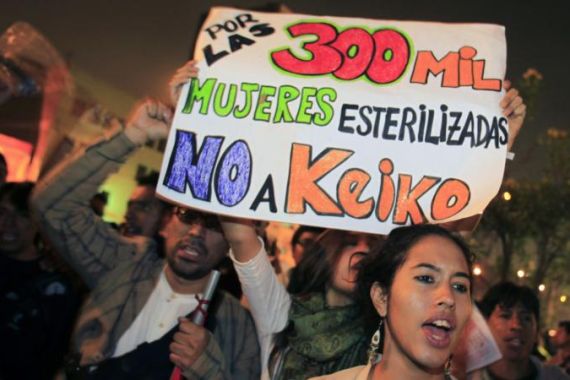Peru’s Fujimori ‘promises’ new policies
In tight presidential race, daughter of jailed former president pledges not to pardon him of “crimes against humanity”.

Just a few days before Peru’s June 5 election, Keiko Fujimori has told Al Jazeera that if she wins, she will distance herself from her father’s dictatorial policies, despite widespread accusations that she will pardon him and employ his advisers.
Polls show the country’s voter base is deeply divided, essentially giving each of the two candidates equal footing, as the country remains in the midst of a recovery process from decades of social and political shock waves.
Alberto Fujimori, Keiko’s father, is just a few years into his quarter-century jail term for “crimes against humanity”, including the forced sterilisation of over 300,000 women.
The younger Fujimori told Al Jazeera’s Mariana Sanchez that even though the Peruvian constitution gives her the power to pardon her father, and that in 2008 she famously said that her “hand would not tremble” to pardon him, she will not.
“To have the support and confidence of the people is to be able to work for everybody, not to work for my family, and this is a promise I’ve made,” she said.
Jonathan Cardenas Grau, a Peruvian political analyst, told Al Jazeera that while freeing her father “would be extremely un-populist”, he is sure that if Fujimori wins, she will “make his stay very comfortable, at the least”.
Whether or not she pardons her father, the election of Fujimori would be more than symbolic.
Keiko Fujimori was herself part of her father’s cabinet – declared First Lady after her parents were divorced.
In the interview to Al Jazeera, she that “if you analyse the list, for instance, of the candidates for congress, 80 per cent of the people are new, 80 that did not work for my father’s government”.
That also means that 20 per cent of her cabinet will have been a part of the dictatorship, leaving many voters and victims of the elder Fujimori unhappy.
Benjamin Dangl, a journalist and author on Latin American politics, said: “Putting Alberto Fujimori behind bars was a huge victory for justice and democracy in a region rife with impunity.
“If elected president, Keiko will likely carry on her father’s legacy, resulting in a blow to the victims of the ex-president’s time in office and the many people working to uphold human rights in the country.”
At a campaign rally in the city of Cajamarca on May 25, Fujimori was met with a barrage of eggs thrown by activists opposed to her candidacy, calling her an “assassin and thief”.
The following day, on May 26, thousands of activists protested in Lima under the banner of the “Fujimori Never Again” collective, organised by The National Co-ordinator of Human Rights.
Despite the sharp divide among voters, Fujimori told Al Jazeera that she will not follow in her father’s footsteps.
“We are having a lot of support from independent people because they know that I will have an efficient government, but will always respect the rules, and that’s something that you can see through the years of my career,” she told Al Jazeera.
One poll report from Thursday moves Humala into first place, but another placed Fujimori in the lead.
Too close to call
Pollsters say that about 10 per cent of voters will abstain from voting, and the candidates are battling for a small sliver of undecided voters to swing the outcome.
Both candidates held final campaign rallies on Thursday, each nipping at the other’s background.
Ollanta Humala, the left-leaning candidate and ex-military man who once led an unsuccessful coup attempt, told cheering crowds in Lima, Peru’s capital city, that he would introduce social programmes to “fight against poverty and inequality, improve education and health, and give more work to the youth”.
Surrounded by supporters, including former president Alejandro Toledo and Nobel Prize-winning writer Mario Vargas Llosa, Humala attacked his opponent, saying that she will not distance herself from her father Alberto Fujimori’s “dictatorial policies”.
“When a people forgets its history, it is condemned to repeat it,” he said.
Fujimori, meanwhile, has promised to maintain free-market policies introduced by her father, and accused Humala of receiving funding from Hugo Chavez, the Venezuelan president.
“Our economy has grown for the last 20 years due to reforms that were made. It’s essential that our country continues on that path,” she said.
After the elections, no matter the outcome, the stigma surrounding the elder Fujimori will continue to motivate people to act on their own sense of power.
“Whoever wins, I don’t think Peruvians are going to let them pervert democracy … I think we are going to have to force their hand to maintain democracy, and there is no other way for many of us now,” Cardenas Grau, the political analyst, said.
“I see protests in the streets. They are already happening.”